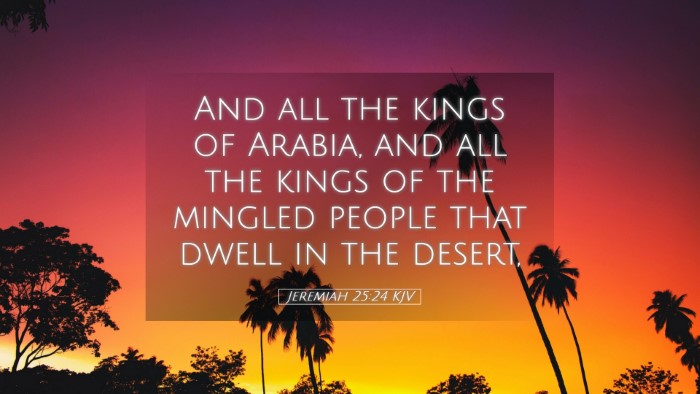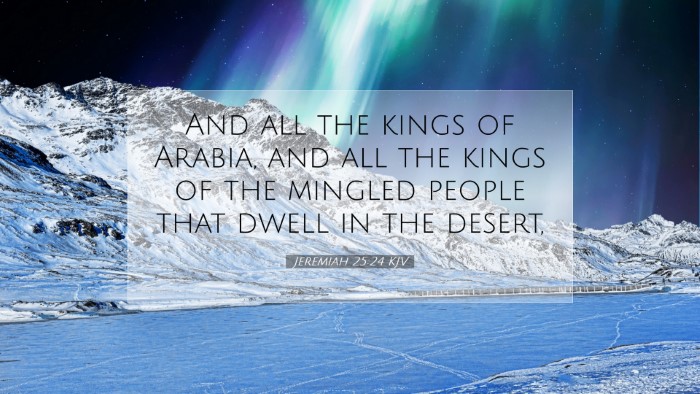Commentary on Jeremiah 25:24
Jeremiah 25:24 states: "And all the kings of Arabia, and all the kings of the mingled people that dwell in the desert, shall come." This verse finds its place within the context of God’s judgment upon the nations, where various powers are addressed. In this commentary, we will explore insights from several public domain commentators to provide a rich understanding of this significant verse.
Contextual Overview
The prophecy of Jeremiah occurs during a period of immense turmoil for Israel and Judah. Speaking of the coming judgment, God declares His intent to bring forth destruction not only upon Judah but also upon various nations. This verse emphasizes the inclusion of the kingdoms of Arabia and other mingled peoples—signifying a broader scope of divine retribution.
Insights from Matthew Henry
Matthew Henry reminds readers of the gravity of judgment that God pronounces against "all the kings of Arabia." He draws attention to how this judgment goes beyond the immediate Jewish context, extending to nations that surround Israel.
- The Significance of Arabia: Henry suggests that Arabia, known for its various tribes and influential merchants, symbolizes those who have prospered at the expense of Israel’s spiritual well-being. These kingdoms are not just geographical entities; they represent the spiritual ramifications of idolatry and disobedience.
- Divine Agency: Henry points out that these gatherings of kings must in some way fulfill God’s sovereign purpose, even if their motives are not immediately clear. Every king mentioned serves as an agent through which God’s judgment is enacted.
Insights from Albert Barnes
Albert Barnes elaborates on Jeremiah 25:24 from a historical perspective, noting the diverse nature of the “mingled people” mentioned in the verse. He identifies these groups as those who dwelled in the desert areas adjacent to Judah.
- Cultural Diversities: Barnes emphasizes that these mingled nations represent a blend of cultures and religions, reflecting the intercourse among the peoples of that time. Their inclusion in Jeremiah’s prophecy indicates that no nation is outside the reach of God’s righteous anger.
- Judgment as a Universal Principle: Barnes further comments that this prophecy teaches the universal principle of God’s justice, suggesting that the judgments experienced by one nation serve as a warning to others against turning away from God.
Insights from Adam Clarke
Adam Clarke provides a theological insight into the broader implications of Jeremiah 25:24, examining God’s intentions behind the judgment.
- Impending World Events: Clarke interprets this verse as indicative of the upheaval that results from moral and spiritual decay. The kings of Arabia, in his view, represent those who, while they may appear politically aloof, are nonetheless entangled in the divine narrative of accountability.
- The Nature of Divine Judgments: Clarke suggests that God’s judgments do not merely inflict punishment; they serve as a call to repentance. The gathering of these kings is a significant sign that God is preparing to correct the course of history.
Theological Implications
The insights from these commentators converge on several key theological implications relevant to pastors, students, theologians, and Bible scholars.
- Divine Sovereignty: The mention of diverse kingdoms demonstrates God’s sovereignty over nations, asserting His authority not only over Israel but also over all the earth. This truth remains pertinent today as nations grapple with their moral standings.
- Call for Vigilance: The prophecy calls for vigilance among God's people. Just as the various kingdoms faced the consequences of their actions, so too must contemporary Christians examine their hearts and actions in light of God’s holiness.
- Hope amid Judgment: Finally, it reminds believers that even amid judgment, God’s justice ultimately aims at redemption. In proclaiming judgment, God invites nations and individuals to turn back to Him.
Conclusion
In summary, Jeremiah 25:24 invites profound reflection on themes of divine justice, the universal nature of God’s sovereignty, and the moral responsibilities of nations before God. Each commentator offers valuable insights into the text, enriching our understanding that God’s word extends beyond its context to reach current readers with a message of both warning and hope.


